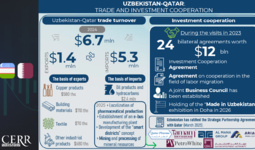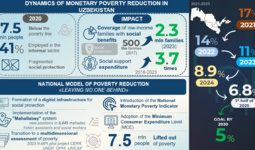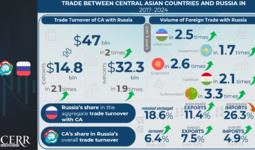The time has come for the third wave of the phenomenon of "Asian tigers", which can be confidently called the representative of Central Asia - Uzbekistan, according to Sovcombank.
A separate economic phenomenon - "Asian tigers" has already entered the textbooks of economics. The first wave of Asian tigers - South Korea, Singapore, Taiwan and Hong Kong - had their finest hour from the 1960s to the 1990s, their explosive growth stabilized after the 1998 Asian crisis.
The tigers of the second wave - Indonesia, Malaysia, Vietnam and Thailand - began modernization in the late 1990s, and at the moment they are already fully participating in the technological chains of the "senior" Asian comrades, approaching them in terms of the structure of the economy. Their businesses earn good profits, the population lives better than the rest of Asia, but the growth of the economies is no longer as strong as it was before.
Now the time has come for the third wave, the locomotive of which can be confidently called the representative of Central Asia - Uzbekistan.
Why should we be sure that Uzbekistan will take over the baton from Southeast Asia and become the next tiger?
All "tigers" were united by one important pattern - the inflow of foreign capital and the improvement in the quality of human potential. These are exactly the factors that are inherent in Uzbekistan today, especially over the past few years.
In terms of human potential, it is worth noting that Uzbekistan has the highest labor productivity ($ 1,700 per capita) among the non-oil Central Asian countries. In terms of this indicator, the Uzbeks have outstripped even Pakistan, whose economy is five times larger.
High labor productivity is not only the result of purchased technologies and foreign equipment. The fundamental factor in the development of human productivity is education. A strong secondary school has been established in Uzbekistan since Soviet times, but the state goes further and develops institutions of higher education.
In total, Uzbekistan spends 5-6% of GDP per year on education - this is one of the highest indicators not only in the CIS, but throughout the world, the same amount is spent on education, for example, by the United States.
Capital inflows from abroad should be a catalyst for structural changes in the economy
The intensification of foreign investment has become possible thanks to the pro-market reforms carried out since 2016. It should be noted the work of the President of Uzbekistan Sh.M. Mirziyoyev, his administration and all departments involved in the development of laws that improve the investment climate and stimulate the economic activity of business.
Liberalization of the foreign exchange market, extensive privatization of state-owned enterprises, the planned liberalization of some domestic prices, modern monetary policy - all thse are extremely positively perceived by foreign investors, who are ready to invest in Uzbekistan more and more every year.
As a result of the launched economic transformation, the Uzbek economy will acquire more features of an industrial and technological country. Uzbekistan already has a relatively high share of industrial production (28%) and services (30%) in GDP, but this is only the beginning of a long journey. Modern factories are opening in the country, equipment is being imported, sooner or later this will lead to a significant increase in the volume of export products and home production.
The real growth rates of the Uzbekistan's economy have exceeded 5% for many years, and this is far from an ordinary situation. Uzbekistan together with Tajikistan became the only CIS countries last year to show positive GDP growth despite the coronavirus pandemic.
Are there factors that can prevent Uzbekistan from making an economic breakthrough?
There is no great loss if we do not take into account unpredictable events, epidemics or global crises. Uzbekistan is a country rich in resources and human capital with a relatively small external debt and a modern progressive government focused on continuing reforms. There are no factors that can slow down or stop the "tiger" on a regular basis.





















leave a comment